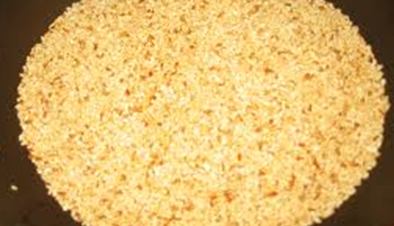
Golden Sesame Seeds
| Botanical Name : | SesamumIndicum |
| English Name : | Golden Sesame Seeds |
| Hindi Name : | Til |
| Family Name : | Pedaliaceae |
Cultivation
India, China, Myanmar, Egypt and African countries. 70% of the world’s sesame crop is grown in Asia and 26% in Africa.
About
Shiny yellow sesame seeds are called “KINGOMA” in Japan and are known for top-shelf luxury sesame seeds often used for KAISEKI cuisine.
“KIN” means “gold” and “Goma” means “sesame seeds” in Japanese.
Compared to those white or black sesame seeds, KINGOMA has a rich oily flavor with a luxury sesame aroma.
Although, Sesame seeds are oil seeds, which are a good source of healthy fats, protein, B vitamins, minerals, fiber, antioxidants, and other beneficial plant compounds.
Regularly eating substantial portions of these seeds not just an occasional sprinkling on a burger bun may aid blood sugar control, combat arthritis pain, and lower cholesterol.
Also Golden Sesame Seeds are rich in anti-inflammatory properties that are vital in healing redness and other facial skin issues by getting rid of pathogens and other agents causing skin infections.
Nutrition Value
Seeds known to be quite rich in many mineral contents like iron, magnesium, manganese, copper, and calcium.
The seeds are also a good natural source of vitamin B1 and vitamin E.
Usage
Our golden sesame seeds are small tasty, unhulled seeds that are used in cereals, crackers, spreads, drinks, casseroles, granola, candies, soups, salads, fish and baked goods.
Also, it is delicious when toasted and sprinkled on grains or main dishes. Known as tahini when ground into a butter.
A nutritious mayonnaise substitute may be made by simply blending sesame seeds with water.
Tahini, which is a main ingredient in hummus, is made from ground sesame seeds.
Packing
Multi wall paper bags/ plastic bags : 50 lbs/ 25 kgs / 25 lbs/ 15 kgs/ and smaller.
